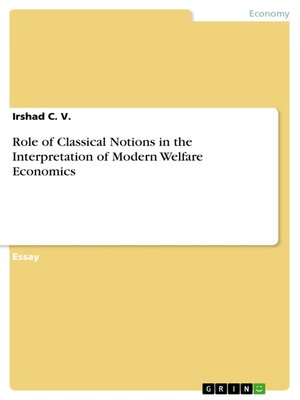
Sign up to save your library
With an OverDrive account, you can save your favorite libraries for at-a-glance information about availability. Find out more about OverDrive accounts.
Find this title in Libby, the library reading app by OverDrive.



Search for a digital library with this title
Title found at these libraries:
| Loading... |
Essay from the year 2016 in the subject Economics - Finance, grade: A, University of Calicut, language: English, abstract: Welfare economics as a multidisciplinary body of knowledge aims at the best way of interpretation of human wellbeing and human endeavor. From the early welfare economics to the present modern welfare economics, a jubilant battle can be seen among different profounders in the welfare interpretation. The methodological difference provides us an opportunity to compare different welfare economic theories and also to improve the understanding of welfare economics. Classical economists were used dynamic and normative methodologies while later developments in welfare economics became narrow-minded by following static and positive economics by putting assumptions, mathematical and other models. Classical theories were influenced in the idea of 'invisible hand' and argue that, the social welfare can be enlarged at the point where the highest level of happiness scan be enjoyed by maximum number. On the other side, the later developments especially by later neoclassical theories began to weaken the role of 'invisible hand'. Moreover the analysis was based on predicting social welfare by simply assuming two individual model frameworks. Here, vividly, the scope of modern interpretation became too extreme by neglecting the role of multiple factors of a plural society in the welfare determination process. Very recently, few interesting welfare interpretations are also coming with multidisciplinary approach like Samuelson's social welfare functions, Sen's capability approach etc. In fact, the methodological battle in handling both qualitative and quantitative variables, classical economists follows general equilibrium analysis while later developments focus on 'Paretian Condition' analysis. So the prediction of social welfare from the Pareto analysis of modern welfare economics has very limited scope than the classical economics.






